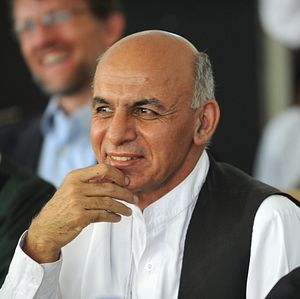Afghanistan’s precarious national unity government deal came under additional doubt Wednesday when presidential candidate Ashraf Ghani indicated in a speech that he would be unwilling to share power with his opponent Abdullah Abdullah.
The two men have been mired in a stand-off over the results of a run-off presidential vote that took place in June. Recently, Abdullah Abdullah unilaterally declared himself the winner of that vote. Under a deal brokered by the United States, the loser of the run-off vote would share power with the victor through a new “chief executive” position.
In his remarks to a press conference on Wednesday, Ghani said that Afghanistan cannot have a “two-headed government.” “We stood, stand, and will stand firm on the formation of the national unity government from the beginning,” Ghani nevertheless declared. Ghani did not explicitly declare that he would refuse to work with Abdullah in a unity government.
He additionally called for the release of the results of the investigation and audit that took place after Abdullah refused to abide by any declared result, alleging that Ghani’s camp was culpable of widespread electoral fraud. Ghani, a former Afghan finance minister, is all but certain that the result will be in his favor, hence his enthusiasm in seeing a final declaration from the Independent Election Commission (IEC) of Afghanistan.
According to Sareer Ahmad Barmak, an IEC official, the final results will likely be announced next week. Barmak did not specify a date. However, Barmak did indicate that the IEC’s decision to announce the results would not be affected by any disagreements between the candidates themselves. This means that Ghani and Abdullah need not necessarily reconcile before a winner is announced.
Given the preliminary results that were announced in June, Ghani had a 1.2 million vote lead over Abdullah with 56 percent of the vote. Abdullah alleged that the run-off election was marred by over two million fraudulent votes.
Although the unity government deal always had its risks, its collapse may lead to uncertain outcomes for Afghanistan. The scenario that most analysts fear is a schism along ethnic lines. Though the two candidates have multi-ethnic support bases and have the declared support of powerful regional leaders from ethnicities other than their own, most of their supporters still identify with their chosen candidate on the basis of ethnicity. Abdullah is a member of Afghanistan’s ethnic Tajik minority while Ghani is a Pashtun, Afghanistan’s largest ethnic group.
A corollary of the ethnicization of this election would be the potential for massively destabilizing political violence. So far, Abdullah’s supporters have not reacted belligerently, but an announcement of victory in Ghani’s favor could shift the balance.
A power-sharing deal, at least in the short-term, could smooth over what is turning out to be a rocky political transition for Afghanistan.
































